-
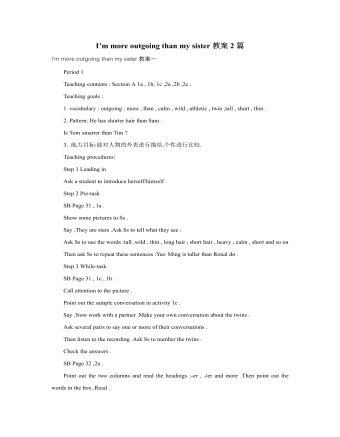
人教版新目标初中英语八年级上册I’m more outgoing than my sister教案2篇
1 交通工具的比较此活动为小组活动。学生通过讨论找出到达某一城市可乘坐的各种交通工具,并选择最佳出行方式。Teacher:We’re going to Shanghai. How many ways can we use to get there? Yes, there are four ways: by bus, by plane, by train, by ship. Please discuss how you are going to get there.操作建议:(1)学生以小组为单位展开活动,谈论本组所选择的交通工具。(2)各组选代表向全班汇报,阐述本组所选择的交通工具的利和弊。完成任务所需要的语言结构:We can go there by ship. It’s more comfortable and cheaper than any other transportation.We can go there by bus. It’s cheaper but it takes longer time.2 哪个城市更合适?此活动具有挑战性。假设中国要举行2014年世界杯足球赛,分别从历史,人文,天气等方面对各城市(北京,大连,上海,昆明)进行比较,选择最佳举办城市。T: Imagine China is holding the 2014 FIFA World Cup. Which city do you think is the best for the World Cup, Beijing, Dalian, Shanghai or Kunming? Let’s work in groups. If you choose Beijing, please join the Team Red. If you chose Dalian, please join the Team White. If you choose Shanghai, please join the Team Blue. If you choose Kunming, please join the Team Green. Please show us its advantages. Then let’s see which team will win.

人教版新目标初中英语八年级下册It’s a nice day, isn’t it教案2篇
"Hello! Welcome to English class! Introduce yourself. Meet your new classmates." That's what the teacher says. What do you say? "Oh no!" It can be difficult talking to new people. But it can be fun, and you can make friends. How do you do it? Make small talk. Small talk is polite conversation. "Wang Nan is a great pingpang player, isn't she?" "I'd love to meet her, wouldn't you?" "It's been raining a lot, hasn't it?" Tag questions are a form of polite speech. To make small talk successfully, you should know how to make them. You should also know what topics to talk about. Try to learn this unit carefully. The next time you're in English class, you'll find out. Making small talk's easy, isn't it? (“你好!欢迎你!请做一下自我介绍。认识一下你的新同学。”通常在课上老师会这样说。你会说什么呢?“噢,不!”与陌生人谈话太困难了。但是这也很有意思,并且你还能交到朋友。你该怎么做呢?闲聊。闲聊指得是礼貌的对话。“王楠是一个很棒的乒乓球运动员,不是吗?”“我希望自己能认识她,你呢?“今年的雨水很多,不是吗?”反意疑问句是一种礼貌用语。为了使得谈话成功,你应该知道怎样去进行闲聊。你还应该知道与不同的人该谈论什么样的话题。认真的学习这个单元吧,下次在英语课上,你会发现与大家展开谈话是一件很容易的事情,不信我们来试试。)

人教版新目标初中英语八年级下册He said I was hard-working教案2篇
This activity introduces some new vocabulary and provide oral practice using the target language.Task 1 . Ask four students to stand in front of the class, and the teacher asks them the following questions as a reporter.1.What are you going to do when you grow up?2.What are you going to do next week?3.What are going to do after school?The students will give different answers, then ask a good student to report what they said.I am going to e a doctor.What did she say?----------She said she was going to be a doctor.I am going to have a party on Friday night.What did he say?-------He said he was going to have a party on Friday night.I am going to do my homework.What did she say ?------ She said she was going to do her homework.I am going home after school.What did she say?-----She said she was going home after school.Say In this unit we are going to learn to use words like to report what someone said.Task 2. Read the instructions. Then ask a student to read the four questions. And write the words on the Bb. Explain what soap opera is.Task 3. Ask the students to Look at the pictures, point out the TV screens in the picture. Ask one girl to read what Marcia said.What did Marcia say? She said She said she was having a surprise party for Lana on Friday night. Repeat the other pictures in the same way.Activity3. Listen and number the pictures in activity 1a.
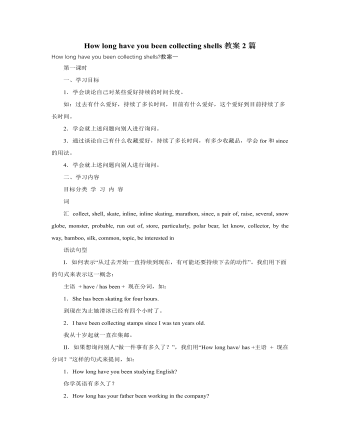
人教版新目标初中英语八年级下册How long have you been collecting shells教案2篇
Step Ⅱ Show the new words on the screen and teach the new words. Read the new words to students and ask them to repeat.Step Ⅲ 3aThis activity introduces new vocabulary and provides reading practice using the target language.In this activity first look at the four pictures.T: What can you see in the pictures?Ss: Four snow globes.T: Right. There are four snow globes in the pictures. And what are they?Ss: They are a monster, two polar bears, two penguins and a birthday cake.Write these words on the blackboard: snow globe; monster; polar bear; penguin and birthday cake. Read them to the class and ask students to repeat each one. Make sure students understand each word.Use a computer to show the E-mail message on the screen and read the message to students.Get students to read the e-mail on their own, and then draw lines connecting each snow globe and its description.Correct the answers.AnswersA line should connect each snow globe picture with the words that describe it in the letter.Step Ⅳ 3bThis activity provides writing practice using the target language.First review Activity 2a on Page 47.Then ask students to complete the message according to Activity 2a.Some partial sentences are given to students. Write about one person's collection.When students work, walk around the room checking the progress and offering help as needed.When they finish, ask some students to read their messages to the class.

人教版新目标初中英语八年级下册What were you doing when the UFO arrived教案2篇
(一).知识方面: 1.培养学生能运用过去进行时来描述、谈论过去某个时间正在发生的事情或动作的意识和能力,能就过去某个时间正在发生的动作做出正确的描述。 2.培养学生的想象力和角色扮演的合作能力。 3.培养学生讲述过去发生的事情经过的能力。能正确运用一般过去时来讲述故事。 (二).技能方面: 1.本单元的语言目标是Talk about past events and tell a story(谈论过去的时间和讲述一个故事),围绕这一目标,要涉及句型: What were you doing when the UFO arrived? ----I was sitting in the barber’s chair. The barber was cutting my hair. 因此必须学习standing、studying、cleaning、sleeping、cooking、making、eating、cutting、等表示地点的词,以便为上述句型提供语言材料。2.学习过去进行时的有关知识。Was/were+现在分词,是该时态的表达式。 3.在学习过程中,要区分The boy was walking down the street when the UFO landed.和While the boy was walking down the street, the UFO landed.这两种由when和while引导的状语从句的句型结构。注意它们的不同。
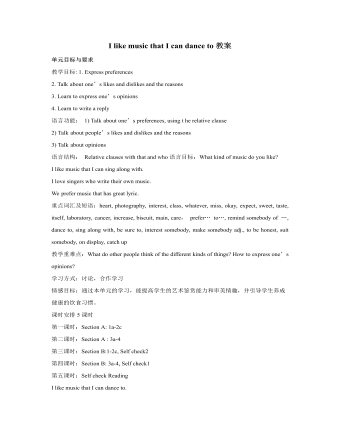
人教版新目标初中英语九年级上册I like music that I can dance to教案
教学目标: 1. Express preferences2. Talk about one’s likes and dislikes and the reasons3. Learn to express one’s opinions 4. Learn to write a reply 语言功能: 1) Talk about one’s preferences, using t he relative clause2) Talk about people’s likes and dislikes and the reasons3) Talk about opinions语言结构: Relative clauses with that and who语言目标:What kind of music do you like?I like music that I can sing along with.I love singers who write their own music.We prefer music that has great lyric.重点词汇及短语:heart, photography, interest, class, whatever, miss, okay, expect, sweet, taste, itself, laboratory, cancer, increase, biscuit, main, care, prefer… to…, remind somebody of …, dance to, sing along with, be sure to, interest somebody, make somebody adj., to be honest, suit somebody, on display, catch up教学重难点:What do other people think of the different kinds of things? How to express one’s opinions? 学习方式:讨论,合作学习情感目标:通过本单元的学习,能提高学生的艺术鉴赏能力和审美情趣,并引导学生养成健康的饮食习惯。课时安排5课时第一课时:Section A: 1a-2c第二课时:Section A : 3a-4第三课时:Section B:1-2c, Self check2第四课时:Section B: 3a-4, Self check1第五课时:Self check ReadingI like music that I can dance to.

人教版新目标初中英语九年级下册By the time I got outside, the bus had already left教案
Ⅰ. Teaching Aims and Demands1. Knowledge Objects(1) Key Vocabularyoversleep(2) Target LanguageWhat happened?I overslept. And by the time I got up, my brother had already gotten in the shower.2. Ability Objects(1) Teach the students to use the new words.(2) Train the students to narrate past events with the Past Perfect Tense.(3) Train the students' listening and speaking skills with the target language.3. Moral ObjectIt’s a good habit to go to bed early in the evening and get up early in the morning. So you’ll never be in a hurry in the morning.Ⅱ. Teaching Key Points1. Key Vocabularyoversleep2. Target LanguageNarrate past events with the Past Perfect TenseⅢ. Teaching Difficult Points1. Train the students to narrate past events with the Past Perfect Tense.2. Train the students to understand the target language in spoken conversation.Ⅳ. Teaching Methods1. Thinking of examples from the students' real lives.2. Making sentences by looking at the pictures.Ⅴ. Teaching AidA tape recorderⅥ. Teaching ProceduresStep I Revision1. Revise the language points in Unit 8.Ask some questions like this: What volunteer work would you like to do?Help the students to answer, I’d like to…/I love to…/I hope to2. Practice the dialogue in Activity 3c on page 62 again. Get students to role play the similar dialogues with the following.

人教版新目标初中英语九年级上册Where would you like to visit教案2篇
The First PeriodⅠ.Teaching Aims and DemandsKnowledge Objects(1) Key Vocabularytiring, educational, fascinating, thrilling, peaceful, exotic, trek, jungle, take it easy, explore, historic, site(2) Target LanguageWhere would you like to go on vacation?I’d like to trek through the jungle, because I like exciting vacations.2. Ability Objects(1)Train students to talk about places they would like to visit with the target language.(2)Train students to describe vacations with different adjectives.(3)Train students' listening skill.3. Moral Object,It′s more interesting to go on vacating somewhere instead of staying at home.Ⅱ. Teaching Key Points1. Key Vocabularytiring, educational, fascinating, thrilling, peaceful, exotic, trek, jungle, take it easy, explore, historic, site2. Target LanguageTalk about different places with the target language.Ⅲ. Teaching Difficult Points1. Describe vacations with different adjectives.2. Talk about different places with the target language.Ⅳ. Teaching Methods1. Teaching by illumination2. Teaching by doing chain drills3. Teaching by pairworkⅤ. Teaching Aids1. A tape recorder2. Some pictures of different places with famous views

人教版新目标初中英语九年级下册I’ll help clean up the city parks教案
Talk about offering help (P60)I’ll help clean up the city parks.A: I’d like to work ...B: You could help ...Talk about ways to tell people about the Clean-Up Day (P61)We need to ...We can’t ...I’ll ...Talk about the work the volunteers do (P62)These three students all volunteer their time to help other people.Somebody loves to ... / helps ... / plans to ... / wants to ...A: What do you like doing?B: I like ... A: What kind of volunteer work do you think I could do?B: You could ...1. 重点词汇advertisement, fix, repair, pleasure, blind, deaf, shut, carry, specially, fetch2. 认读词汇hunger, homeless, cheer, clean-up, sign, establish, major, commitment, elementary, veterinarian, coach, similar, call-in, strategy, disabled, organization, unable, support, appreciate, donation, part of speech, pronoun, adverb, preposition, conjunction, donate, Jimmy, Sally3. 词组clean up, cheer up, give out, put off, set up, think up, take after, fix up, give away, put up, hand out, work out, at once

人教版新目标初中英语九年级下册You’re supposed to shake hands教案
教学目标:1. 掌握本单元一些重点词汇的写法和用法。2. 学会自如谈论餐桌礼仪。Step 1 RevisionAsk some students to retell the customs at the table in France in the passage in 3a.Step 2 Self checkPart 1. Fill in each bland with the correct word given. Students do the exercises by themselves at first. Then check the answers. Ask the students to comprehend the sentences and help them point out uses of some words, like “arrive (at / in) sw., spend time / money on sth , spend time / money (in) doing sth.”Part 2. Read about Fan Ling’s experience in a western restaurant. Understand the passage. Point out some key points in the passage.1. be / get used to doing sth. 习惯做某事2. begin with = start with 以….开头3. crowd v. 挤满,塞满 the crowd 人群 crowded adj. 拥挤的Then students discuss about how she would solve her problem. Ask some to share their stories with others.Part 3. Complete the crossword by looking at the sentences on the left. Then check the answers.
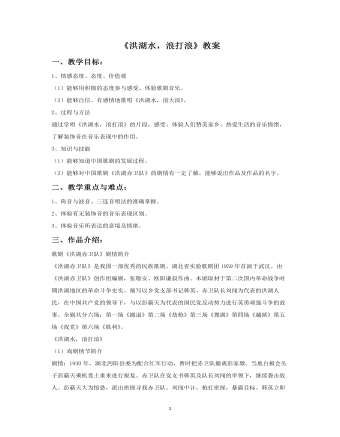
《洪湖水浪打浪》教案
《洪湖水,浪打浪》这个唱段是这部歌剧中唯一的一首抒情歌曲。选自歌剧的第三场”搜湖”。剧情发展是这样的:清晨,迎着冉冉升起的红日,脚踏洪湖万顷碧波,韩英与秋菊一起划船到芦苇深处去找战友。情不自禁地唱出“洪湖水,浪打浪……”借以抒发赞美故乡,憧憬未来的情怀。这首歌先由韩英独唱,而后是韩英与秋菊的二重唱。这首歌富有浓郁的湖北地方风格。它的原始素材是湖北民歌《襄河谣》,原民歌是四个乐句的乐段结构,经过曲作者精心构思,变化、发展、引申,谱成了这首变化再现的三段体结构的歌曲。歌曲的第一段A是起、承、转、合的四句体单乐段。第四乐句(合句)采用戏曲拖腔的手法将乐句扩充为三小节,这样既突破了乐段的方整性,又增强了乐段的收束感。歌曲的第二段B是对比段,由三个乐句构成,属于非常规乐段。B与A的对比是多方面的,包括节拍、演唱形式、节奏、句式等。结尾句中使用了第一段的拖腔,在变化中求得了统一。歌曲的第三段A是第一段的变化再现,前两个乐句的旋律仍是完全再现,真正的变化再现是第三、第四个乐句,这里不仅旋律发生了明显的变化,而且还伴有乐句结构的扩展:由于歌词的内容和句式的变化,以及情感表达的需要,第三乐句扩展为3小节;第四乐句扩展为6小节。最后结束句的拖腔仍然回到A段的音调上,体现出了再现的意义。也表达了歌中主人公对革命必胜的信念。
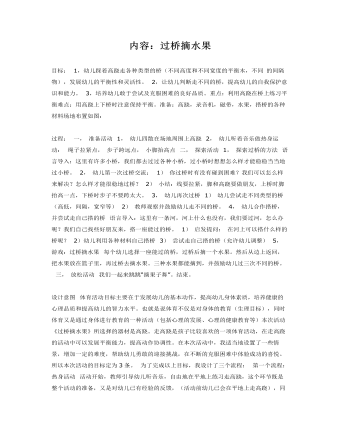
大班体育教案:过桥摘水果
过程: 一,准备活动 1,幼儿四散在场地周围上高跷 2,幼儿听着音乐做热身运动: 绳子拉紧点,步子跨远点,小脚抬高点 二,探索活动 1,探索过桥的方法 语言导入:这里有许多小桥,我们都去过过各种小桥,过小桥时想想怎么样才能稳稳当当地过小桥。 2,幼儿第一次过桥交流: 1)你过桥时有没有碰到困难?我们可以怎么样来解决?怎么样才能很稳地过桥? 2)小结:线要拉紧,脚和高跷要做朋友,上桥时脚抬高一点,下桥时步子不要跨太大。 3,幼儿再次过桥 1)幼儿尝试走不同类型的桥(高低,间隔,宽窄等) 2)教师观察并鼓励幼儿走不同的桥。 4,幼儿合作搭桥,并尝试走自己搭的桥 语言导入:这里有一条河,河上什么也没有,我们要过河,怎么办呢?我们自己找些好朋友来,搭一座能过的桥。 1)启发提问:在河上可以搭什么样的桥呢? 2)幼儿利用各种材料自己搭桥 3)尝试走自己搭的桥(允许幼儿调整) 5,游戏:过桥摘水果 每个幼儿选择一座能过的桥,过桥后摘一个水果。然后从边上返回,把水果放在篮子里,再过桥去摘水果。三种水果都能摘到,并鼓励幼儿过三次不同的桥。 三,放松活动 我们一起来跳跳“摘果子舞”。结束。
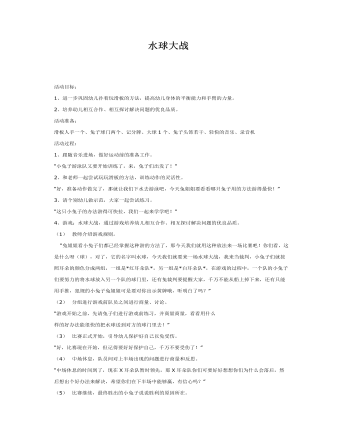
大班体育教案:水球大战
2、培养幼儿相互合作、相互探讨解决问题的优良品质。 活动准备: 滑板人手一个、兔子球门两个、记分牌、大球1个、兔子头饰若干、轻快的音乐、录音机 活动过程: 1、跟随音乐进场,做好运动前的准备工作。 “小兔子游泳队又要开始训练了,来,兔子们出发了!” 2、和老师一起尝试玩玩滑板的方法,训练动作的灵活性。 “好,准备动作做完了,那就让我们下水去游泳吧,今天兔姐姐要看看哪只兔子用的方法游得最快!” 3、请个别幼儿做示范,大家一起尝试练习。 “这只小兔子的办法游得可快拉,我们一起来学学吧!” 4、游戏:水球大战,通过游戏培养幼儿相互合作、相互探讨解决问题的优良品质。
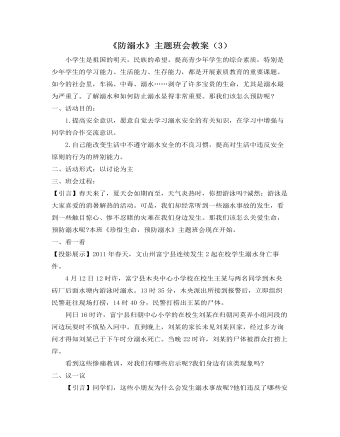
《防溺水》主题班会教案(3)
三、班会过程: 【引言】春天来了,夏天会如期而至,天气炎热时,你想游泳吗?诚然:游泳是大家喜爱的消暑解热的活动。可是,我们却经常听到一些溺水事故的发生,看到一些触目惊心、惨不忍睹的灾难在我们身边发生。那我们该怎么关爱生命,预防溺水呢?本班《珍惜生命,预防溺水》主题班会现在开始。 一、看一看 【投影展示】2011年春天,文山州富宁县连续发生2起在校学生溺水身亡事件。4月12日12时许,富宁县木央中心小学校在校生王某与两名同学到木央砖厂后面水塘内游泳时溺水。13时35分,木央派出所接到报警后,立即组织民警赶往现场打捞,14时40分,民警打捞出王某的尸体。同日16时许,富宁县归朝中心小学的在校生刘某在归朝河莫弄小组河段的河边玩耍时不慎坠入河中。直到晚上,刘某的家长未见刘某回家,经过多方询问才得知刘某已于下午时分溺水死亡。当晚22时许,刘某的尸体被群众打捞上岸。看到这些惨痛教训,对我们有哪些启示呢?我们身边有该类现象吗?
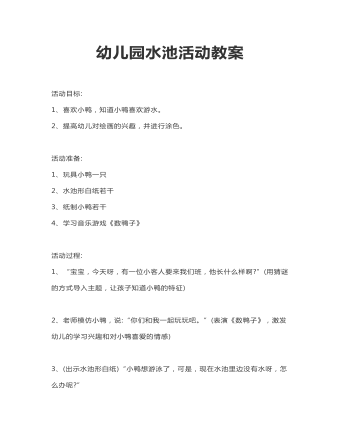
幼儿园水池活动教案
活动过程:1、“宝宝,今天呀,有一位小客人要来我们班,他长什么样啊?”(用猜谜的方式导入主题,让孩子知道小鸭的特征) 2、老师模仿小鸭,说:“你们和我一起玩玩吧。”(表演《数鸭子》,激发幼儿的学习兴趣和对小鸭喜爱的情感)
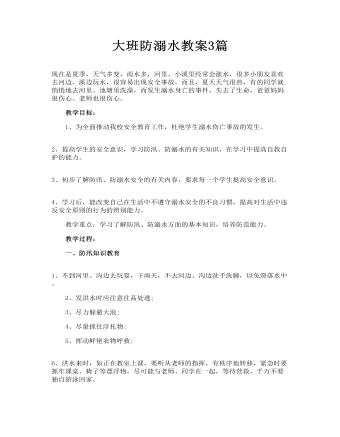
大班防溺水教案3篇
教学目标: 1、为全面推动我校安全教育工作,杜绝学生溺水伤亡事故的发生。 2、提高学生的安全意识,学习防汛、防溺水的有关知识,在学习中提高自救自护的能力。 3、初步了解防汛、防溺水安全的有关内容,要求每一个学生提高安全意识。 4、学习后,能改变自己在生活中不遵守溺水安全的不良习惯,提高对生活中违反安全原则的行为的辨别能力。 教学重点:学习了解防汛、防溺水方面的基本知识,培养防范能力。

乌鸦喝水一等奖教案
1、初读课文,提出识字要求: 师:刚刚小朋友听的故事就是我们语文书上19课的内容,(齐读课题)我们一起去看看吧!请小朋友轻声读课文,遇到生字应该怎么办?(课件出示识字要求) 2、识字游戏: A.师:小乌鸦知道小朋友都很聪明,他现在就想要来考考大家呢! (课件:乌鸦站在苹果树上,树上的每个苹果上都有一个生字,谁读对了就随机奖励一个苹果小贴花,并让他当小老师带全班同学读一读。) B.请2-3个小组开火车读(师:小火车开起来!生:开到哪?师:开到这!)。 C.全班齐读。
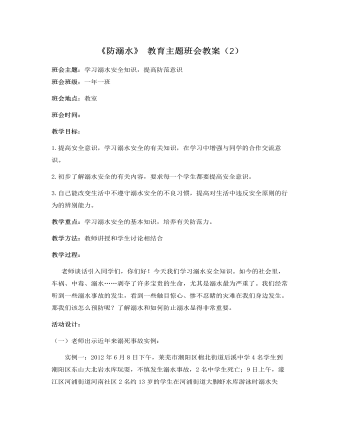
《防溺水》主题班会教案(2)
游泳,是广大青少年喜爱的体育锻炼项目之一。然而,不做好准备、缺少安全防范意识,遇到意外时慌张、不能沉着自救,极易发生溺水伤亡事故。为了确保游泳安全,防止溺水事故的发生,必须做到以下几点:1)不要独自一人外出游泳,更不要到不摸底和不知水情或比较危险且宜发生溺水伤亡事故的地方去游泳。选择好的游泳场所,对场所的环境,如该水库、浴场是否卫生,水下是否平坦,有无暗礁、暗流、杂草,水域的深浅等情况要了解清楚。2)必须要有组织并在老师或熟悉水性的人的带领下去游泳。以便互相照顾。如果集体组织外出游泳,下水前后都要清点人数、并指定救生员做安全保护。3)要清楚自己的身体健康状况,平时四肢就容易抽筋者不宜参加游泳或不要到深水区游泳。要做好下水前的准备,先活动活动身体,如水温太低应先在浅水处用水淋洗身体,待适应水温后再下水游泳;镶有假牙的同学,应将假牙取下,以防呛水时假牙落入食管或气管。
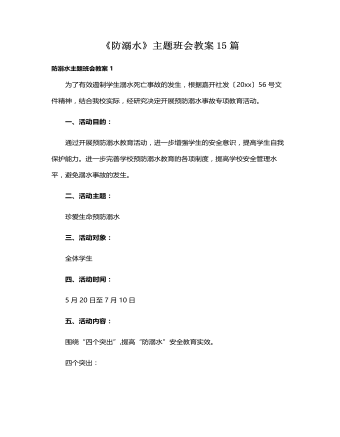
《防溺水》主题班会教案15篇
为了有效遏制学生溺水死亡事故的发生,根据嘉开社发〔20xx〕56号文件精神,结合我校实际,经研究决定开展预防溺水事故专项教育活动。一、活动目的:通过开展预防溺水教育活动,进一步增强学生的安全意识,提高学生自我保护能力。进一步完善学校预防溺水教育的各项制度,提高学校安全管理水平,避免溺水事故的发生。二、活动主题:珍爱生命预防溺水三、活动对象:全体学生四、活动时间:5月20日至7月10日五、活动内容:围绕“四个突出”,提高“防溺水”安全教育实效。四个突出:1、突出抓重点对象教育,对平时擅自游泳的学生及时做好思想工作,进行细致入微的教育。2、突出抓重点时段教育,如:放学、双休日、节假日等。3、突出抓防溺知识教育,教育学生正确的自护自救和相互急救方法等。4、突出抓纪律教育,一经发现私自游泳的,要立即制止和批评教育,杜绝溺水事故发生。
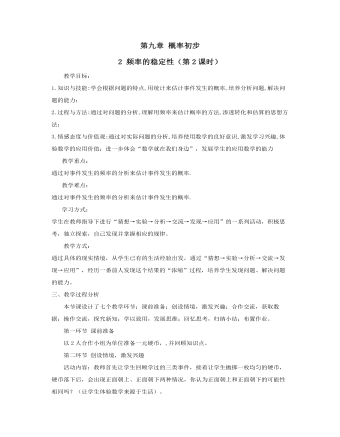
频率的稳定性教案教学设计
活动内容:教师首先让学生回顾学过的三类事件,接着让学生抛掷一枚均匀的硬币,硬币落下后,会出现正面朝上、正面朝下两种情况,你认为正面朝上和正面朝下的可能性相同吗?(让学生体验数学来源于生活)。活动目的:使学生回顾学过的三类事件,并由掷硬币游戏培养学生猜测游戏结果的能力,并从中初步体会猜测事件可能性。让学生体会猜测结果,这是很重要的一步,我们所学到的很多知识,都是先猜测,再经过多次的试验得出来的。而且由此引出猜测是需通过大量的实验来验证。这就是我们本节课要来研究的问题(自然引出课题)。

